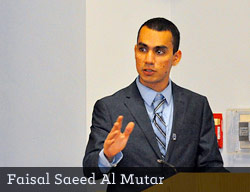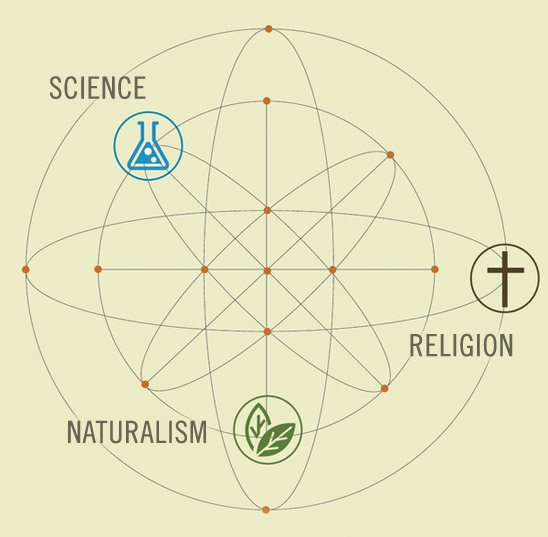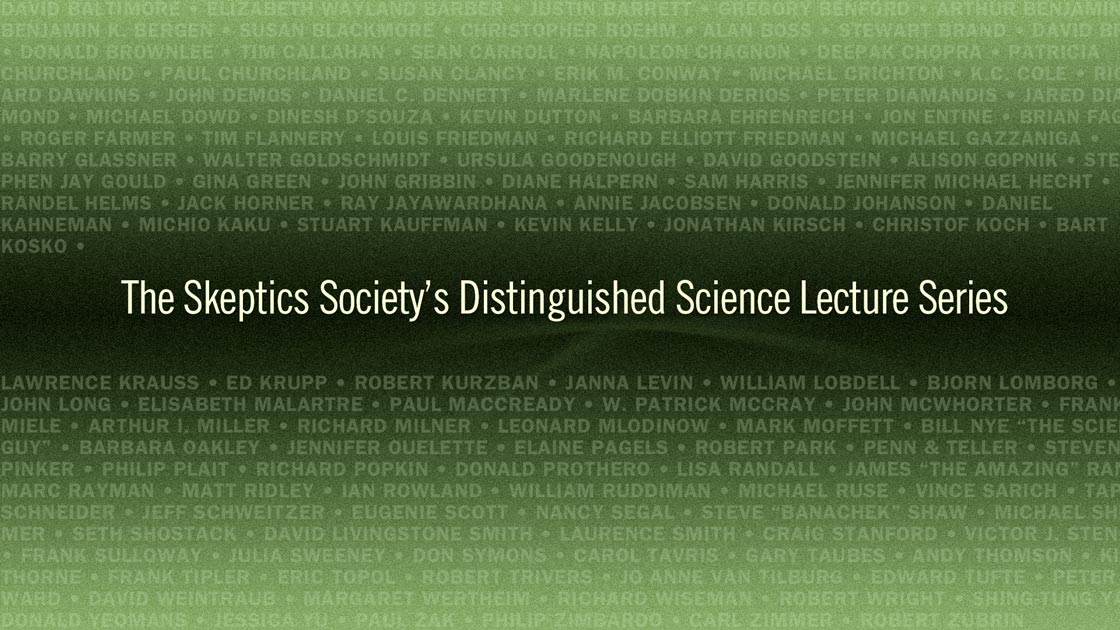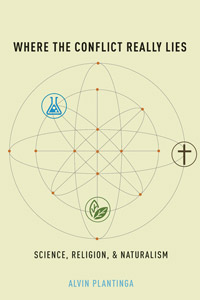In this week’s eSkeptic:
Announcing the Spring 2014 Season
of Distinguished Science Lectures
MARK YOUR CALENDAR! The Skeptics Society is pleased to announce another season of our Distinguished Science Lecture Series at Caltech. All lectures will take place in Baxter Lecture Hall on a Sunday at 2 pm. Events include an author book signing. Tickets are sold first come, first served, at the door. Seating is limited. $10 for Skeptics Society members and the JPL/Caltech community, $15 for nonmembers. Your admission fee is a donation that pays for our lecture expenses. First up…

Me, Myself and Why: Searching for the
Science of Self
with Jennifer Ouellette
Sun., Jan. 26, 2014 at 2 pm
POPULAR SCIENCE WRITER Jennifer Ouellette has tackled math in The Calculus Diaries and physics in both The Physics of the Buffyverse and Black Bodies and Quantum Cats. In Me, Myself and Why she turns her attention to the science of the self and delivers a fascinating survey of the forces that shape who we are and why we act the way we do. Ouellette acts as both journalist and subject, as she takes a battery of personality tests, has her genes sequenced and an MRI brain scan done, and even goes on her first and only LSD trip, all the while taking the reader along for the ride. As an adoptee, with basic information about her biological parents, Ouellette considers what traits she undeniably has inherited through genetics and what traits she has in common with her siblings (also adoptees) and her parents, which leads to a fascinating discussion on synapses and how the brain is wired and continues to change as we grow older.
Order Me, Myself and Why from Amazon.
Followed by…
- Wizards, Aliens, and Starships:
Physics and Math in Fantasy and Science Fiction
with Dr. Charles Adler
Sunday, February 16, 2014 at 2 pm - Neanderthal Man: In Search of Lost Genomes
with Dr. Svante Pääbo
Sunday, March 2, 2014 at 2 pm - The Son Also Rises: Surnames and the History
of Social Mobility
with Dr. Gregory Clark
Sunday, March 16, 2014 at 2 pm - Trying Not to Try: The Art and Science of Spontaneity
with Dr. Edward Slingerland
Sunday, April 13, 2014 at 2 pm - Humble Before The Void: Western Science Meets
Tibetan Buddhism
with Dr. Chris Impey
Sunday, May 18, 2014 at 2 pm

SKEPTICALITY

Out of Iraq
With the coming anniversary of Isaac Newton’s birthday, Derek sat down to have a chat with Faisal Saeed Al Mutar. Until about 9 months ago, Faisal was living in Iraq where he was at odds with the Sunni, Shai, and Al-Qaeda. He now lives in the United States after being granted asylum. In his short time living in the United States, he was gone on to help build an amazing community of people dedicated to making society a better place through the promotion of humanism, secular values, and skeptical thinking.
MONSTERTALK
Cryptozoologicon
Volume I
Darren Naish returns to MonsterTalk to discuss his latest book, Cryptozoologicon: Volume I. From the well known to the very obscure, this book takes three looks at monsters. It critically examines them, but also speculates on what they might be like if they were real — combined with fantastic illustrations by science illustrators John Conway and C. M. Koseman.
The Latest Episode of Mr. Deity: Mr. Deity and The War
And, just in time for Christmas, Jesus and Mr. Deity prepare for war…
DONATE | NEWSLETTER | FACEBOOK | MrDeity.com

About this week’s eSkeptic
All scientists are naturalists, taking for granted that we live, experiment and study nature in a closed universe where God never intervenes. This is a first principle of science. But Alvin Plantinga says that there is deep conflict between naturalism and science but deep concord between theism and science. In this week’s eSkeptic, William S. Moore reviews Plantinga’s Where the Conflict Really Lies: Science, Religion, and Naturalism.
William S. Moore is an evolutionary biologist and Professor Emeritus in the Department of Biological Sciences, Wayne State University. He has published numerous scientific articles on natural selection, speciation and molecular phylogenetics.
Debunking Plantinga
by William S. Moore
All scientists are naturalists. When we do experiments in the laboratory or field we assume that the phenomena we study are guided by natural law and solely by natural law, and that natural law acts the same way at all times throughout the universe. We are uniformitarians; uniformitarianism holds that natural law is universal and eternal. We take for granted that we live, experiment and study nature in a closed universe where God never intervenes. This is a first principle of science. So reading a book by Alvin Plantinga, a highly respected philosopher and epistemologist of religion with a great deal of savvy about science, that reaches the conclusion that there is deep conflict between naturalism and science but deep concord between theism and science, is a journey into a spooky intellectual landscape where this first principle of science is violated.
The die for Plantinga’s argument is cast on the first page of the preface where he proclaims: “Naturalism is stronger than atheism: you can be an atheist without rising to the full heights (sinking to the lowest depths?) of naturalism; but you can’t be a naturalist without being an atheist.” Between this opening salvo and his conclusion on the last page (350)—“naturalism is at least a quasi-religion, there is indeed a science/religion conflict all right, but it is not between science and theistic religion: it is between science and naturalism”—is an arduous trek through evolutionary biology, quantum mechanics, historical biblical criticism, intelligent design, divine fine tuning of physical constants, and epistemology. The trek through epistemology is a steep climb through the peculiar cultural lexicon of philosophers, with diversions to establish the nature of warranted belief, rebutting defeaters (of arguments), undercutting defeaters, deflectors of defeaters and defeater-defeaters. A distinction he makes that actually has little influence on the practice of science is between methodological and rational naturalism. All scientists are at least methodological naturalists—we all make the assumption that God is not manipulating the experiments we do. But Plantinga identifies strident atheist-naturalists like Richard Dawkins, Daniel Dennett, Christopher Hitchins and Sam Harris as rational naturalists whom, he writes, as “the Four Horsemen—not of the Apocalypse, nor of Notre Dame, but of atheism with the goal of riding roughshod over religion.” (Plantinga retired recently from Notre Dame University.) This distinction is central to his argument; rational naturalists are atheists, and so naturalism must be in conflict with theistic religion, but being a scientist requires only that you be a methodological naturalist. You can be an agnostic or even a theist and be a methodological naturalist.
The theory of evolution by natural selection looms large in Plantinga’s analysis, and he is particularly critical of Dawkins, who he says is not warranted in claiming that the science of evolutionary biology, as successful as it is, disproves the existence of God. He argues that the claim evolution is a process unguided by an intelligent, theistic force is a metaphysical “add-on,” an assumption evolutionists make rather than a conclusion that can be drawn from the theory of evolution or a fact proven by empirical science. In my opinion, Plantinga’s argument is actually right. Neo-Darwinism—the modern theory of evolution resulting from the conjunction of Darwin’s theory of natural selection with modern genetics—does not debunk theism in an absolute sense, but it certainly fails to confirm it. Life has been intensely studied from a Darwinian perspective for over 150 years, and not one shred of scientifically creditable evidence has emerged that is inconsistent with the theory or that would suggest theistic intervention. And we are talking about millions of experimental results, millions of observations—millions of bits of information. So in defense of Dawkins’ conclusion, how long does one wait at a bus stop before concluding that there no longer is bus service along this route? At some point you decide you would do well to find another mode of transportation.
Plantinga accepts evolution as the mechanism by which the diversity, complexity and specialization (design) of life has come to be, and he even believes that there is a role for natural selection. What he rejects is the premise that evolution is completely unguided. He believes that God intervenes episodically, for example, to generate specific mutations that would cause the evolution of a designed anatomical structure, physiological process or behavior in a specific lineage. Among the array of elements he views as having been designed are human cognitive abilities for doing mathematics and inductive reasoning. From Plantinga’s perspective, which is that of Christianity, God not only created the universe, He created man in His own image, which Plantinga extends to mean He endowed humans with His cognitive skills to comprehend and understand His creation. In an appeal to William Paley’s (and Michael Behe’s) design arguments, he asks how else could you explain mathematical and inductive abilities that have no obvious adaptive value in the hunting-gathering cultures in which humans evolved.
But these cognitive abilities are easily accommodated by natural selection theory. To engage in inductive reasoning is to draw generalizations from a few specific observations—in more mundane terms, it is to learn from experience. This obviously has considerable adaptive value in the struggle for existence and even occurs in many other species. It takes just one bad experience with a snake that rattles its tail to learn to stay away from snakes that rattle their tails, and humans, to their benefit, also transmit this kind of information from generation to generation through culture. Mathematical aptitude is more likely a “spandrel,” which is an incidental by-product of another function. (In a classic 1979 paper entitled “The Spandrels of San-Marco and the Panglossian Paradigm: A Critique of the Adaptationist Program” (Proceedings of the Royal Society B-Biological Sciences 205, 581–59) Stephen Jay Gould and Richard Lewontin compared many biological structures to the spandrels of San Marco cathedral in Venice, which serve admirably as surfaces for mosaics depicting features of Christianity. The spandrels are triangular areas of ceiling formed by intersecting arches but are by-products of the church’s architecture. Given that they are there, why not fill them with glorious Christian iconography?) But doing mathematics involves cognitive aptitudes for logic, envisioning objects in spaces, enumeration and strategic thinking, which are very plausibly adaptive even in hunting gathering societies. Humans engage in many activities that are likely spandrels of natural selection, for example, playing golf, which some humans do with amazing ability. Clearly natural selection did not directly select the best golfers during the Paleolithic, but presumably favored individuals that were athletic, had the best hand-eye coordination, were able to judge distances accurately, etc. That is at least as plausible as the notion that God designed humans—in his own image—to play golf.
Using the combative lexicon of epistemology, Plantinga introduces the concept of an undercutting defeater with this example: He sees a person that looks like his neighbor Paul emerge from the house across the street, and he forms the belief that Paul is leaving his house. But, he then learns that Paul has an identical twin brother, Peter, who arrived the previous night to stay over. This additional information undercuts Plantinga’s original belief, and so he must reform his belief to either Paul or Peter left the house. These are now alternative hypotheses that could be tested by gathering additional information such as learning idiosyncrasies from their respective wives that distinguish the brothers. By analogy, the posited, evolved adaptive values of inductive and mathematical abilities are alternatives to the hypothesis that God created man in his own image, and hence has access to these tools for acquiring knowledge. In a much broader realm, this is what neoDarwinism is: a successful alternative hypothesis to theism.
Plantinga continues his argument that science and theism are compatible suggesting that the omnipotent God of Christianity created a universe with sufficient regularity that it has the appearance of uniformitarianism—quasi-uniformitarianism (my term). If that were not the case, we couldn’t do science. But Plantinga’s model is that of an open universe, open to occasional moments of guiding intervention, when for example, God might cause a series of mutations guiding evolution to the complex anatomical and cognitive changes that enable human speech. Well, this is a plausible idea if you grant the possibility that God exists, but it is not testable. The God described throughout Christian literature and by Plantinga is omnipotent and omniscient and capable of causing the mutational changes necessary to guide evolution but to do so with such subtlety that we cannot detect His actions. But this violates another principle in the epistemology of science, which is that scientific theories must be testable and, more specifically, falsifiable. A major redirection of the philosophy of science in the latter half of the 20th century was instigated by Karl Popper, who argued that the line of demarcation between science and non-science is falsifiability. Plantinga’s hypothesis that evolution has been subtly directed by mutations divined by God is simply not falsifiable. This is an irreconcilable conflict between science and Christian theology and is an epistemological conflict rather than a defeater offered up by science. Plantinga does not cite Popper nor discuss this fundamental aspect of science.
Plantinga discusses two areas of conflict between science and Christian theology, which he deems superficial: evolutionary psychology and historical biblical criticism (HBC). In the practice of HBC, biblical scholars have adopted the uniformitarian principle from science, rejecting the notion that the miracles portrayed in scripture—including Jesus’ resurrection—actually occurred. Of course this is a direct contradiction to traditional Christian, faith-based analysis centered on the miracle of Jesus’ resurrection. Not surprising, these biblical scholars interpret New Testament scripture as narratives that reflect cultural, religious and political attitudes as Christianity emerged and then diverged from Judaism during the tumultuous time of oppressive Roman occupation rather than as historically reliable accounts of Jesus ministry.
Evolutionary psychology is a logical extension of neoDarwinism that provides a theoretical framework for understanding human behavior. Its premises are that major aspects of human behavior are genetically determined and have evolved as adaptations to natural selection. Given that elements of modern religions (belief in spiritual beings, life after death, spiritual or divine intervention in events, providence, demons, worship, rituals, sacrifice, etc.) are cultural universals, occurring in hunting-gathering, agrarian and modern societies, it is sensible to think that religiosity is also part of evolved human nature. One of its proposed values in the face of natural selection is that it promotes group cohesion. Accordingly, religious beliefs, to include belief in god, miracles, life after death, etc., are unreliable reflections of reality—they are delusions, but they are reliable adaptations for enhancing the transmission of genes to future generations. Obviously this is a blatant conflict with the Christian worldview. Plantinga does not dwell at length on these superficial conflicts, but rather turns to his most surprising and original argument for deep conflict between science and naturalism, which is based on the unreliability of beliefs generated by our cognitive faculties (the human mind) given that they evolved under the guidance of natural selection.
The essence of his argument is that if you accept naturalism (and thus atheism) and you believe in evolution by natural selection (unguided evolution), then the probability of your beliefs being reliable (true) should be low because selection operates to maximize survivorship and reproductive success, not accuracy of beliefs about reality. But he then turns this argument around, claiming our beliefs are in fact reliable; therefore unguided evolution (naturalism) must be wrong—this is a defeater for naturalism! So he claims.
I disagree. For the sake of discovering reality, let’s set aside philosophy and look at the empirical evidence. The reliability of beliefs varies widely. Many Americans believe Barack Obama was not born in the United States, for example. That’s not a very reliable belief. As another example, self-esteem is a belief about one’s worth and is notoriously unreliable. Many people I know underestimate their esteem, some overestimate theirs, and a few have it about right. Of course, my estimate of someone else’s self-esteem may be unreliable. As another example, the essential narrative of Christianity—the story of Jesus’ ministry and resurrection—is supported by little if any objective empirical evidence, which is the conclusion reached by historical biblical critics, and yet the Christian narrative is held to be true and accurate by millions of people. So, obviously many beliefs are unreliable, including the essential beliefs of Christianity. Of course some personal beliefs are reliable, but the reality of personal beliefs is hit-and-miss at best. On the other hand, the belief that DNA is the genetic molecule, the earth orbits the sun, and E=mc2 are reliable beliefs and are held to be true by essentially all knowledgeable, rational human beings. The difference between the two sets of examples is that beliefs like Barack Obama was not born in the U.S. and self-esteem are subjective beliefs reached by single individuals in the absence of, or even in spite of, evidence to the contrary, whereas the latter are objective beliefs reached by the culture of science though application of the scientific method. These objective beliefs are usually reliable—that DNA is the genetic molecule is as close to absolutely true as anything we claim to know.
Plantinga argues further that if you believe naturalism and (unguided) evolution, you have a defeater for your own belief—you have a belief that “shoots itself in the foot” because natural selection would evolve cognitive faculties “designed” to maximize survivorship and reproductive success and not the veracity of beliefs about where we came from, why we are here, or the meaning of life. By contrast, he argues, cognitive faculties designed in the image of God would be reliable in those respects. He then turns the argument around and says that our beliefs are, in fact, for the most part reliable, and if that is true then the conjunction of naturalism and unguided evolution must be false.
What Plantinga does not seem to recognize is the vast difference between the reliability of personal beliefs and beliefs derived from the practice of science. The belief that all organisms came to be the way they are through the process of evolution by natural selection is as reliable as any scientifically based belief, including relativity and quantum mechanics.
There are concordances and conflicts—deep and superficial—among science, religion and naturalism, but they do not match well the pattern Plantinga suggests. If you accept Plantinga’s stipulation that you must be an atheist to be a naturalist, then obviously there is a conflict between theism and naturalism. But, many—I suspect most—scientists are not atheists, rather they are agnostics. They say “we just can’t know.” All scientists are naturalists, at least to the extent of being methodological naturalists. It would make no sense to do experiments if one concluded that God had intervened when the results were not as expected. Rather, we rethink the theory, modify it to accommodate the unexpected results and go on to test the theory further. The distinction between rational (hard-core, atheistic) naturalism and methodological naturalism is actually superficial. To do science, you must be a uniformitarian when you are in the laboratory or field—you must leave theism at the laboratory door. What difference does it make if you are a theist, an agnostic or an atheist in your “other life”?
So, where does the conflict really lie? There is no conflict between naturalism and science—you must embrace naturalism at least while you are doing science. But there is an irreconcilable conflict between the epistemologies of science and religion—in what constitutes knowledge and how to obtain knowledge. Choosing between the epistemologies can be addressed only by passing judgment on what each has accomplished. Science has produced technology, religion has not. ![]()
Philip Zimbardo, On Demand
The Lucifer Effect: Understanding
How Good People Turn Evil
How is it possible for ordinary, average, even good people to become perpetrators of evil? Dr. Zimbardo, Professor of Psychology at Stanford University, ran the famous “Stanford Prison Experiment” in the late 1960s that randomly assigned healthy, normal intelligent college students to play the roles of prisoner or guard in a projected 2 week-long study that he was forced to terminate after only 6 days because it went out of control, with pacifists becoming sadistic guards, and normal kids breaking down emotionally. More…
Rent this video for only $3.95
or explore the entire series.
INSTRUCTIONS: Click the button above, then click the RENT ONE button on the page that will open in your Internet browser. You will then be asked to login to your Vimeo account (or create a free account). Once you complete your purchase of the video rental for $3.95, you will then be able to instantly stream the video to your computer, smartphone, or tablet, and watch it for a period of 72 hours.















